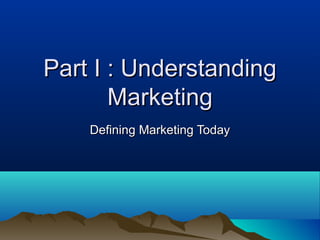
Aaa marketing today
- 1. Part I : Understanding Marketing Defining Marketing Today
- 2. The Importance of Marketing • Financial success often depends on marketing ability due to sufficient demand for products and services so the companies can make a profit • Newly empowered customers and new competitors make the companies rethink their business models : Change or Die • Therefore, the right decisions on new products, prices, promotion mix budget, and sales force from short term sales to long term relationship (satisfy their stockholders)
- 3. The Scope of Marketing • Marketing is typically seen as the task of creating, promoting, and delivering goods and services to stakeholders • Exchange, which is the core concept of marketing, is the process of obtaining a desired product from someone by offering something in return • To make successful exchanges, marketers analyze what each party expects from the transaction • When an agreement is reached, we say that a transaction takes place. A transaction is the agreement to trade the values between two or more party • What is marketed? (10 types of entities): goods, services, experiences, events, persons, places, properties, organizations, information, and ideas.
- 4. Company Orientation toward the marketplace (i) • What philosophy should guide a company’s marketing efforts? Six competing concepts: a. The Production Concept: consumers will prefer products that are widely available and inexpensive. Thus, mass production and mass distribution are a must b. The Product Concept: consumer will favor those products that offer the most quality, performance or innovative features c. The Selling Concept: the organization must undertake an aggressive selling and promotion efforts
- 5. Company Orientation toward the marketplace (ii) d. The Marketing Concept: company being more effective than competitors in creating, delivering, and communicating superior customer value (customer orientation) • The job is not to find the right customers for your products, but the right products for your customers. That is by understanding and meeting customers’ expressed needs • The result is all functions must work together and must “think customer” so that company can respond, serve, and satisfy the customers
- 6. Contrast Between the Sales Concept and Marketing Concept Starting Focus Means Ends Point Sales Factory Products Selling & Profits through Concept Promoting sales volume Marketing Target Customer Integrated Profits through Concept market needs Marketing customer satisfaction
- 7. Company Orientation toward the marketplace (iii) e.The Holistic Marketing Concept is based on the development, design, and implementation of marketing programs, process, and activities that recognizes integrated perspective for companies to operate and compete in a new marketing environment. Four components of Holistic marketing are: relationship marketing, integrated marketing, internal marketing, and social responsibility marketing
- 8. Holistic Marketing Dimension Products & Senior Other Services Marketing Management Department Depatment Communications Channels Internal Integrated Marketing Marketing Holistic Marketing Socially Relationship Responsible Marketing Marketing Ethics Community Customers Channel Partners Environment Legal
- 9. Fundamental Marketing Concepts (i) • Needs (basic human requirements), Wants (specific object that might satisfy the need) and Demands (specific products backed by ability to pay) • Target markets, positioning and segmentation • Offering (a set of benefits) and Brand (product association and identity) • Value (reflects perceived benefits and costs to customers) and Satisfaction (product performances versus his expectations) • Marketing Channels: Communication Channel ex. Internet; Distribution Channel ex. Wholesaler; Service Channel ex. Banks, Insurance or other specialists job
- 10. Fundamental Marketing Concepts (ii) • Supply chain: longer channel from raw material to final products that are carried to final buyers. It represents the value delivery system starts from procurement, research and development, production, and marketing channels bringing products to customers. • Competition: as rivals offering and substitute that a buyer might consider. • Marketing environment: consists of task environment (such as company with integrated marketing, suppliers, distributors, target customers, and competitors) and broad environment (such as political, technological, cultural and demographics environment) • The Marketing environment will influence the Company Marketing Strategy: determine initially the target customer, offering marketing mix 4, supported by Marketing information system, in order to interact with task environment in the scope of broad environment
- 11. Marketing Management Trends • Marketers are fundamentally rethinking their philosophies, concepts,and tools: a. From organizing by product units to organizing by customer segment b. From emphasizing tangible assets to emphasizing intangible assets, ex brand, customer base, relationship marketing c. From focusing on profitable transaction to focusing on customer lifetime value (customer retention)
- 12. Marketing Management Task • Capturing marketing insights: marketers need marketing information system to monitor task environment and broad environment • Communicating value: about the brand they sell • Creating long term growth by initiating new product development and global opportunities and challenges